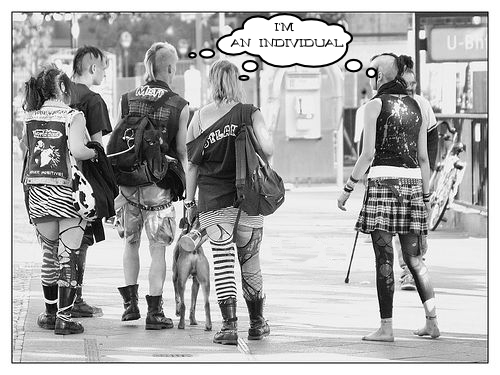
The Empire of the Rising Scum
(Originally published in Loompanics Catalogue 1990, this is the text we mentioned in our previous ‘psychEDelica‘ post. The S3LF feel that this is a very important article… and it will definitely cheer you up if you’re reading it at work.)
A thousand reforms have left the world as corrupt as ever, for each successful reform has founded a new institution, and this institution has bred its new and congenial abuses.
– George Santayana
When I tell people that I am a anarchist (if I want to be treated somewhat politely I say I am a “libertarian”) often the first challenge thrown at me is, “How would people get along without organization? If it was every man or woman for themselves, the human race would die off.”
I could point out that this is quite possibly the fate we’re headed for with the help of our many and mighty organizations. But instead I usually say that, though it may surprise them, I too believe in the necessity of organization. Indeed, if our ancestors of millions of years ago hadn’t learned how to care for one another and hunt in packs, they’d all have ended up being eaten by leopards.
The key element in tragedy is that heroes and heroines are destroyed by that which appears to be their greatest strength. Of all human inventions the organization, a machine constructed of people performing interdependent functions, is the most powerful. Because it is so powerful, the organization is more dangerous than any other human invention, including nuclear fission (itself the product of an organized scientific project).
Even while we busily attend meetings, contribute money and perform our assigned tasks, we suspect that we may be helping to create a force that is inimical to many values we hold dear. This suspicion of anything organized is manifested in the often-heard remark. “I’m not against religion, just organized religion.” Indeed, the term “organized religion” is never used except by people who are against it.
There is folk wisdom in this. An organized religion tends to require that its members live in certain specified ways and accept certain specified beliefs. What’s more, those requirements are presented as a package deal. To reject even one major tenet of the religion or to violate one major rule of behavior is enough to get one kicked out–or worse. Organized religion provides a model of the way all organizations, from the state down to the village garden club, end a price in terms of a member’s freedom of thought and action.
Elaine Pagels, in The Gnostic Gospels, suggests that when two sects are competing the one with the more authoritarian structure, stricter discipline and more rigid belief system win lend to win out. The early Gnostics were egalitarian in structure and acknowledged that any member-even females!-might have a valid theological insight. The Gnostics were rapidly driven out of business by the hierarchical orthodox Christians. It doesn’t seem possible for an organization to be egalitarian, democratic and allow its participants great latitude in belief and behavior and still outdo competitors more tightly controlled. Just as predatory animals follow a similar general design and behave in similar ways, so organizations, especially those in competition with one another, must follow certain design principles if they are to succeed and prevail.
Military organization, like religious organization, can be seen as a paradigm of organization in general. Indeed, one of the most successful and influential religious organizations in history, the Society of Jesus, was consciously modeled along military lines by its founder, Ignatius Loyola. The very nature of military operations–organized violence–requires a highly authoritarian structure. As Napoleon put it, “One bad general is better than two good generals.”
That the more authoritarian organizations survive and prevail goes generally unnoticed because people focus on the objectives of organizations, which are many and varied, rather than on their structures, which lend to be similar. Whenever people see a problem, an opportunity or a threat, their first reaction–even before saying, “Pass a law’” -is, “Let’s start an organization.”
But the more an organization succeeds and prospers, the more it is likely to be diverted from its original ideals, principles and purposes. While Francis of Assissi was still alive, the religious order he founded, dedicated to poverty, had already started to acquire real estate.
Every combination of two or more human beings has both a useful aspect and a political aspect. These tend to conflict with each other. As the political aspect becomes more and more influential, the organization ceases to be useful to its members and starts using them.
Why does this happen? Because the better an organization is at fulfilling its purpose, the more it attracts people who see the organization as an opportunity to advance themselves.
The ability to get ahead in an organization is simply another talent, like the ability to play chess, paint pictures, do coronary bypass operations or pick pockets. There are some people who are extraordinarily good at manipulating- organizations to serve their own ends. The Russians, who have suffered under such people for centuries, have a name for them– apparatchiks. It was an observer of apparatchiks who coined the maxim, “The scum rises to the top.”
The apparatchik’s aim in life is to out-ass-kiss, out-maneuver, out-threaten, out-lie and ultimately out-fight his or her way to the top of the pyramid-any pyramid. Appropriately, Russia produced a superb specimen of homo apparatchikus–Josef Stalin. Many American novels have described the wheeling and dealing of apparatchiks in various occupations; perhaps the classic fictional character of this kind is Sammy Glick, the movie tycoon in Budd Schulberg’s novel, What Makes Sammy Run? Niccolo Machiavelli wrote a handbook for apparatchiks that is unsurpassed to this day–The Prince. But the most successful of this breed need neither exemplars or hand-books; they seem to know instinctively what to do.
It often happens that when a person possesses a particular ability to an extraordinary degree, nature makes up for it by leaving him or her incompetent in every other department. Thus we see owners of baseball teams who lack any understanding of the sport, heads of banks who couldn’t balance a checkbook, industrialists whose main industry is riding around in fancy limos, and generals who know more about playing golf with congressmen than they do about fighting wars.
Unfortunately, the existence of this talent means that every successful organization will sooner or later be taken over by apparatchiks. As such people achieve influence within the organization, whenever there is a conflict between their own interest and the interest of the organization, their interests will win out. Thus, over time, the influence of apparatchiks will deflect the organization further and further from its original intent.
For this reason, the most admirable time in the history of any institution is its early days–Ford and his Tin Lizzie, Edison at Menlo Park, Jesus wandering through Palestine, Castro in the Sierra Maestra, Hefner at his kitchen table. These are the days when organizations are most visionary and goal-oriented and are least encumbered by internal politics.
It is instructive, for instance, to trace the computer industry’s decline in vision, idealism, creativity, romance and sheer fun as it becomes more and more important and prosperous. In a few short years the hackers, those talented, inventive people who created this industry have been shuffled into the background with the explanation that ‘”they don’t know how to run a business,” and the apparatchiks have moved in like buzzards after a buffalo hunt. The truth is that apparatchiks don’t know how to run a business either, but it is their gift to look as if they do. When it comes to inter-corporate fighting, an engineer who knows how to design a superlative computer has no more chance against an apparatchik than he would in the ring with a sumo wrestler.
Whatever the original aim of the organization, to publish books, to heal the sick, to share information about computers, once it has been taken over by apparatchiks, it will acquire a new aim–to get bigger. It doesn’t matter whether a bigger organization will fulfill its purpose as well, serve its customers or constituents as well, or be as good a place for people to work. It will get bigger simply because those at the top want it to get bigger. Apparatchiks do to organizations what cancer viruses do to cells; they promote purposeless growth.
To quote Santayana again: “Fanaticism consists in redoubling your effort when you have forgotten your aim.”
The apparatchiks not only want their own organization to get bigger; they also want it to swallow up or defeat and destroy all other organizations. Thus we see, in Communist countries, the party runs everything from the state police to the local chess club; whereas in capitalist countries one corporation will manufacture cars, rent out security guards, publish newspapers, bake bread, launch space satellites and pave over rain forests. The tendency of capitalist corporations, whose greatest achievements are due to free competition, to try to eliminate competition and form monopolies is typical of what happens to institutions that get taken over by apparatchiks.
The apparatchik seeks with the same blind inevitability to expand in yet another direction–beyond the agreed-upon limits of authority. Anyone who seeks power wants absolute power. Every Roman emperor, every Medieval and Renaissance monarch who succeeded in getting an armlock on the job immediately sought to expand his power beyond the limits set by law and custom. Every U.S. President who has been accorded the title “great” by historians has attempted to exceed his Constitutional authority, from Jefferson purchasing Louisiana to Lincoln setting aside habeas corpus to Roosevelt trying to pack the Supreme Court.
The ultimate means for determining top’ apparatchik is war. This whole phenomenon of the diversion of organizations from their purposes and ideals does not seem very serious when the scum rise to the top in the bridge club or the offices of a small magazine publisher. But today it is happening on a global scale. At the moment the threat of war between the world’s two most powerful apparatchiks, the President of the U.S. and the Premier of the Soviet Union, is receding. But we’ll be turning another comer soon, when people like the Ayatollah get the Bomb. The world’s leaders will then have to decide whether to swallow up smaller nations run by voracious apparatchiks or let the whole world go up in smoke. Whatever decision they make, it will probably be a bad one.
I don’t wish to convey a “nothing works and everything is futile” attitude. I think there may be ways to tame the organizational beast, though I have hardly room in this essay to do more than suggest that such means exist.
Could we do away with organizations? A few fringe philosophers are attracted to a vision of what might be tenDed the heat death of society–the idea that only dummies participate in organized activity and that the smart folks live on the margins, shoplifting and eating out of garbage cans.
The obvious drawback to this notion is that it requires a multitude, living in the organized way they do now, to keep the garbage cans filled and the store shelves stocked. Thus we’re still stuck with organization as we know it.
One simple way to keep organizations from becoming cancerous might be to rotate all jobs on a regular , frequent and mandatory basis, including the leadership positions. While it may seem wasteful for people to spend part of their time working at jobs they are not particularly good at, and even detrimental to the organization’s goals, the healthiest societies do seem to be those that encourage people to do a variety of things–as in pioneer America. A permanent division of labor inevitably creates occupational and class inequality and conflict. As Robert A. Heinlein said through Lazarus Long, ‘”Specialization is for insects.”
Speaking of insects, entomologists have found that life is pretty good for those insects that live as self-sufficient individuals; they have plenty of food, lots of leisure and are good at protecting themselves from predators. Whereas among the so-called social insects, the individual’s well-being is largely sacrificed to the needs to the group.
Individuals, too, who cultivate a variety of skills seem brighter, more energetic and more adaptable than those who know how to do one thing only. Not all of us can be polymaths, like Leonardo, Thomas Jefferson or Steve Allen, but we can all learn how to do a few more things than we know how to do now, and the adding of skill to skill can be a lifelong and most rewarding process. And, of course, the more self-sufficient we are, the less we will be dependent upon organizations.
Ultimately we may still ask, why can’t humans design a perfect society? But there is no reason why anything in the universe should work perfectly. Only Dianeticians and Christians start from the assumption that humans should be perfect and that an explanation is needed for why they are not. The rest of us know that life is the trial and error produce of billions of years of fumbling by what biologist Richard Dawkins calls “The Blind Watchmaker.” It’s a wonder it works as well as it does.
If you enjoy this work, please visit http://bobshea.net/ for more insights.





